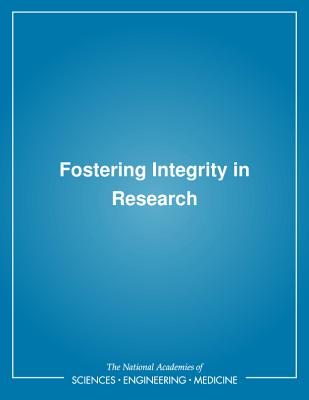The integrity of knowledge that emerges from research is based on individual and collective adherence to core values of objectivity, honesty, openness, fairness, accountability, and stewardship. Integrity in science means that the organizations in which research is conducted encourage those involved to exemplify these values in every step of the research process. Understanding the dynamics that support – or distort – practices that uphold the integrity of research by all participants ensures that the research enterprise advances knowledge. The 1992 report Responsible Science: Ensuring the Integrity of the Research Process evaluated issues related to scientific responsibility and the conduct of research. It provided a valuable service in describing and analyzing a very complicated set of issues, and has served as a crucial basis for thinking about research integrity for more than two decades. However, as experience has accumulated with various forms of research misconduct, detrimental research practices, and other forms of misconduct, as subsequent empirical research has revealed more about the nature of scientific misconduct, and because technological and social changes have altered the environment in which science is conducted, it is clear that the framework established more than two decades ago needs to be updated. Responsible Science served as a valuable benchmark to set the context for this most recent analysis and to help guide the committee's thought process. Fostering Integrity in Research identifies best practices in research and recommends practical options for discouraging and addressing research misconduct and detrimental research practices. Table of ContentsFront MatterSummaryPart One: The Integrity of Research1 Introduction2 Foundations of Integrity in Research: Core Values and Guiding Norms3 Important Trends and Challenges in the Research EnvironmentPart Two: Research Misconduct and Detrimental Research Practices4 Context and Definitions5 Incidence and Consequences6 Understanding the Causes7 Addressing Research Misconduct and Detrimental Research Practices: Current Knowledge and Issues8 Exploring New ApproachesPart Three: Fostering Integrity in Research9 Identifying and Promoting Best Practices for Research Integrity10 Education for the Responsible Conduct of Research11 Findings and RecommendationsAppendixesAppendix A: Biographical Information on the Committee and StaffAppendix B: Agendas of Committee Meeting Public SessionsAppendix C: Assessing the Effectiveness of Responsible Conduct of Research Training: Key Findings and Viable ProceduresAppendix D: Detailed Case HistoriesAppendix E: Bibliography
Get Fostering Integrity in Research by at the best price and quality guranteed only at Werezi Africa largest book ecommerce store. The book was published by National Academies Press and it has pages. Enjoy Shopping Best Offers & Deals on books Online from Werezi - Receive at your doorstep - Fast Delivery - Secure mode of Payment
 Jacket, Women
Jacket, Women
 Woolend Jacket
Woolend Jacket
 Western denim
Western denim
 Mini Dresss
Mini Dresss
 Jacket, Women
Jacket, Women
 Woolend Jacket
Woolend Jacket
 Western denim
Western denim
 Mini Dresss
Mini Dresss
 Jacket, Women
Jacket, Women
 Woolend Jacket
Woolend Jacket
 Western denim
Western denim
 Mini Dresss
Mini Dresss
 Jacket, Women
Jacket, Women
 Woolend Jacket
Woolend Jacket
 Western denim
Western denim
 Mini Dresss
Mini Dresss
 Jacket, Women
Jacket, Women
 Woolend Jacket
Woolend Jacket
 Western denim
Western denim
 Mini Dresss
Mini Dresss






























































